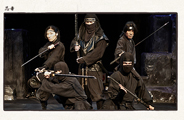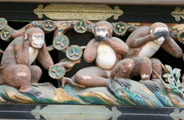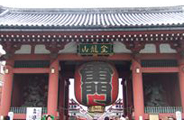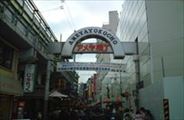Alluring Japanese sweets make the perfect gifts from Japan! (2/2)

Japanese sweets are popular gifts not only within Japan, but for tourists from abroad as well. As the charm of Japanese sweets extends even to appearance, it's tempting to choose a beautiful treasure that will charm its recipient. In the second half of this feature, we will introduce Japanese sweets whose traditional techniques shine, focusing on famous confections from established shops. We have carefully selected items with a focus not only on flavor, but also on shelf life!
Shelf life: 30 days from production date
When you open the square box, you will find a glimmer like that of stained glass. "Gyokueidohikokuro," located in Ningyomachi--a low-lying area that represents Tokyo--is a Japanese sweets shop established over 400 years ago in Kyoto. This established shop stands tall among others, and the "kooriishi" it produces is a lovely, famous confection that is sure to inspire fondness at first sight, even for people unaware of the weight of its history.

"Kooriishi" (1,000 yen). It has a cool-looking appearance that is pleasing in summer, but we also recommend having it with hot tea during cold times. We hear that it is often served at tea parties.
When the sugar membrane--similar to a thin sheet of ice--splits apart in your mouth, the texture transforms, becoming similar to gelatin. After that softly melts, what remains is a sweet, refreshing aftertaste. This is a simple sweet in which sugar is boiled down and solidified with agar, but you'll mysteriously find yourself wanting more. Another highlight is that, befitting a Japanese sweet, the colors change by season, with blue included in summer, for example. The juxtaposition of its cuteness--it is a guaranteed hit with girls--and its status as an established shop's famous confection is sure to grab the interest of the person to whom you hand this gift.

"Gyokuman" (650 yen). Also known as "Ogyokumanju." People are often treated to this on celebratory occasions.
We recommend this as a snack for yourself!
"Gyokuman"
Shelf life: 3 days from production date
This is a "manju" (sweet jam bun) in which the craftsmanship shines--cut it to reveal a colorful, 5-layered cross-section. It has considerable weight, but with its elegant sweetness, you can bite right in. As it has a short shelf life, we recommend it as a snack during your trip!
Gyokueidohikokuro
2-3-2 Ningyomachi, Nihonbashi, Chuo-ku, Tokyo
Phone: 03-3666-2625
Store Hours: Monday to Friday 9 AM - 9 PM; Saturday 9 AM - 8 PM; Sunday and Holidays 9:30 AM to 5 PM
No Set Holidays
Shelf life: 50 days from production date
How about this Japanese sweet for the person who wants to eat a variety of different things? "Fukiyose," by "Ginza Kikunoya," an established shop that makes Edo (the former name for Tokyo) Japanese sweets, is a long-selling famous confection that has been loved for nearly 100 years. Open the can to find bountiful dried confections in a variety of shapes and colors.

"Red Circle Can" (1,260 yen). The design of the can, fragrant with Japanese spirit, is also acclaimed--we hear that many people reuse it.

Each of the small confections has a presence. Just lining them up on a plate is picturesque.
"Fukiyose" was modeled after dried sweets of the same name (but written with different characters) that are served at tea gatherings, and is a product in which various confections have been miniaturized and put together. Over 30 types are included, with the idea for each being carefully thought out, and they are a pleasure to behold. There are several types of popular Japanese-style cookies alone, and the variety of flavors is rich. In particular, the "Red Can" contains items such as sugar-coated peanuts, black beans, and seasonal "unpei" (swirl cookies)--it's just like a treasure chest. The real pleasure, and something unique to "Fukiyose," is wavering over which type to eat next.

"Kankobai" (left) and "Tokiwa no Matsu," acquired in early January, at the time of coverage (378 yen each).
We recommend this as a snack for yourself!
"Creative Japanese Sweets - 'Kankobai' and 'Tokiwa no Matsu'"
Shelf life: 2 days from production date
As long as you're visiting an established shop, how about trying what can be called the essence of Japanese sweets--"jonamagashi" (high-grade, fresh Japanese sweets)? Experience these gems--magnificent expressions of the elegance of Japan--with your eyes and taste buds.
Ginza Kikunoya Main Store - Ginza Core
Ginza Core 1F, 5-8-8 Ginza, Chuo-ku, Tokyo
Phone: 03-3571-4095
Store Hours: 11 AM - 8 PM
No Holidays
http://www.ginza-kikunoya.co.jp/
Shelf life: 1 month in summer and 3 months in winter from production date
In Japan, "amezaiku" (candy craftsmanship, or the candy that is crafted) is an old-fashioned traditional craft, so to speak. In the past, artisans known as "amezaikushi" (candy craftsmen) displayed their splendid manipulation at events such as festivals, and one could often see children begging their parents for candy that had been transformed into shapes such as animals or flowers.

"Three-Colored Cat (stretching)" (1,155 yen) and "Parakeet (blue)" (1,470 yen). The expression of the cat's flexibility and the parrot's feathers is magnificent! These prices both include the price of the demonstration; there is a 105 yen discount to purchase one that is already completed.
"Amezaiku Yoshihara" is a specialty amezaiku shop--Japan's first--opened by the amezaikushi Mr. Takahiro Yoshihara in order to spread the vanishing art of amezaiku. Completed amezaiku can be purchased as well, but you'll surely want to choose the demonstration sale, in which you can see the precious traditional craft right before your eyes. Fingertips knead and pull, and with a cut of the scissors, starch syrup becomes a cat or a bird in an instant! How about giving an amezaiku as a gift, along with this magical spectacle as a story from your trip?

"Mini Amepyon (heart)" (945 yen). There are a number of other variations of Amepyon as well.
We recommend this, too!
"Mini Amepyon (candy rabbit) (heart)"
Shelf life: 1 month in summer and 3 months in winter from production date
There are also numerous varieties of amezaiku of "Amepyon," the shop's mascot, that are already completed. We hear that a number of fundamental amezaiku techniques are used in the making of this rabbit.
Amezaiku Yoshihara
Tomoe Building 1F, 1-23-5 Sendagi, Bunkyo-ku, Tokyo
Phone: 03-6323-3319
Store Hours: 12 PM - 7 PM (reception for demonstration sales is until 6 PM)
Set Holidays: Monday, Tuesday (open on national holidays)
http://ame-yoshihara.com/
*The shelf life listed refers to the number of days from the production date in all instances. In practice, this may shorten depending upon the timing of the production and purchase.



























